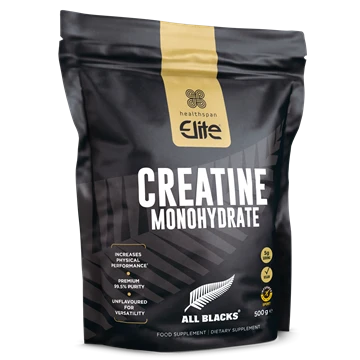Creatine has long been a go-to for boosting strength and performance among the fitness crowd. But this natural nutrient isn’t just for beefy bodybuilders, lean athletes or keen gym goers; it plays a vital role in how the body produces and stores energy, making it important for anyone who wants to stay firing on all cylinders throughout life.
What is creatine?
Creatine is a compound made naturally in our bodies. Its job is to provide energy by helping produce and maintain ATP (adenosine triphosphate), the energy currency of our cells.
Made in the liver, kidneys and pancreas and stored mainly in tissues and organs that are hungry for energy, such as the muscles (where 95% is stored), creatine is also found in animal-derived foods and products, such as meat, fish and poultry. Plant-based foods, however, contain no creatine, making it hard for vegetarians, vegans and anyone eating a mainly plant-based diet to get enough. For this reason, many people choose to top up their levels with a creatine supplement.
Read more: Common vegan diet deficiencies.
What does creatine do?
During short bursts of activity – be it a sprint round the athletics track, running to catch a bus or a task requiring mental energy – our cells use up ATP quickly. Creatine helps to recycle ATP, ensuring there is enough energy to fuel the body and brain.
How much creatine do you need per day?
While there’s no official recommended daily amount, experts suggest we need about 2 grams of creatine a day (based on a 70 kg male). A typical carnivorous diet supplies around half of that, with around 1 gram a day produced in the body.
Current changes in eating habits and other factors, such as age and sex, mean that many of us aren’t getting enough creatine through diet and natural processes alone. Indeed, US research suggests almost half of adults fail to reach 1 gram a day.
Taking a daily supplement can help ensure your muscle and brain cells get the energy they need to stay strong, sharp and working at their best. You may benefit from a creatine supplement if you:
- Have cut down on meat, poultry and/or fish for your health and/or that of the planet.
- Are vegetarian or vegan.
- Have less appetite as you are growing older or are restricting how much you eat.
- Have a health condition that boosts the need for creatine.
- Are female – women have 70–80% lower natural creatine stores than men.
- Want to support muscle and brain health as you get older.
How to take creatine
If you’re wondering how much creatine you should take, researchers suggest 3-5 grams a day (0.1 grams per kilogram of body mass) is optimal.
When to take creatine
You can take creatine at any time of day, but consistency is key to seeing results. Some people prefer it before or after exercise, while others simply take it with a meal. The most important thing is to make it part of your daily routine so your muscles can build and maintain their creatine stores.
How long does creatine take to work?
How long it takes to see the desired effects of creatine depends on how much you take and how often. Registered nutritionist Rob Hobson suggests taking 5 grams a day for muscles to reach their full level in around a month. For quicker results, he suggests you might want to try 20 grams a day (split into four 5 gram servings) for five days, then go on to 5 grams a day to maintain. It’s your choice.
Registered nutritionist and sports nutritionist Robert Hobson says:
“A growing body of evidence suggests that creatine may support cognitive function, particularly in ageing populations and during periods of mental fatigue. There’s also interesting research into its role in muscle preservation during illness or inactivity, which could have real implications for older adults or those with low appetites. This is a great example of how a well-researched sports supplement is now being repurposed to support health across the lifespan.”
What age can you take creatine?
Creatine is generally recommended for healthy adults aged 18 and over, as most research has focused on this age group. Anyone under 18 should only consider creatine use on the advice of a healthcare professional.
Creatine benefits
Creatine is fast emerging as a key nutrient to support muscle and brain health, especially as we age. Studies have found that it can help…
Support healthy muscles
Creatine has been shown to offer impressive benefits for maintaining healthy muscles, particularly as we age. Studies show that people aged 60 to 80 who took creatine for 12 weeks alongside supervised resistance training gained more muscle, leg strength and endurance than those who didn’t supplement. Postmenopausal women also saw gains in strength and bone density after a year of creatine use, while women over 60 improved muscle endurance and functional movement in just 12 weeks. The European Food Safety Authority (EFSA) supports its use in combination with resistance training to improve muscle strength in people over 55.
Research also suggests creatine may help preserve muscle during weight loss, supporting both strength and fat loss later in life.
Support brain health
Research shows that creatine offers impressive benefits for brain health. In one study, just five days of creatine helped people feel less mentally fatigued when tackling challenging maths problems. Older adults taking creatine have been shown to perform better in memory and thinking tasks, and a 2024 systematic review found it was particularly effective for improving memory in those aged 66-76. Early evidence also suggests creatine may help lift mood, with one study showing people who consumed the most were a third less likely to experience depression, and there are signs it could support mood and reaction time after a poor night’s sleep.
Related: Sarcopenia: how to combat muscle loss as you get older.
Aid recovery
Creatine can be a game-changer for speeding up recovery. Research suggests it can help preserve muscle, maintain strength, and support physical function, especially during rehabilitation from injury or illness or following surgery.
Discover more muscle recovery supplements.
Support vegetarian and vegan diets
People following a vegetarian or mainly plant-based diet tend to have lower levels of creatine, which can have an impact on physical performance, particularly during high-intensity exercise and recovery. For those on a vegan diet, this effect may be even more pronounced, as they are often low in vitamin B12 – an important nutrient that plays a role in the body’s natural creatine production. Therefore, a creatine supplement can be extremely beneficial for supporting healthy levels.
Read more about how to safeguard your health when going vegan.
Improve women’s health
Women in particular may benefit from creatine supplementation as they naturally have around 70–80% lower creatine stores than men, a difference that can be more noticeable during exercise, menopause or certain phases of the menstrual cycle. Research suggests creatine can help counteract some of the menopause-related decline in muscle, bone and strength, making it a valuable addition to a woman’s long-term health and fitness routine.
Discover the best vitamins and supplements for women.
Improve overall health
As well as giving you energy in daily life, creatine is a key player in heart contraction and helps ensure the heart has enough energy to work properly. Creatine also acts as an antioxidant, helping protect the body from harmful oxidative stress.
Take our quiz to learn about your heart health personality.
Is creatine safe?
Yes. Creatine is one of the most extensively researched supplements, with thousands of studies confirming its long-term safety and effectiveness. The European Food Safety Authority (EFSA) has approved daily intakes of up to 3 grams for adults, giving it a strong seal of approval. Creatine monohydrate, the most common and well-studied form, is generally well-tolerated and simple to incorporate into your everyday routine.
5 reasons to take creatine every day
- Stay strong and active – by helping your muscles work better at work, rest and play.
- Support a healthy brain – helping improve focus, memory, mental alertness and mood, especially if you’re tired or stressed.
- Boost energy – by improving energy supply in cells, creatine helps fight fatigue and keeps you on the ball all day long.
- Help you recover – so you bounce back faster from illness, injury or surgery.
- Age well – creatine is one of the best supplements to support health in later life.
Creatine FAQs
Does creatine cause hair loss?
There’s no strong scientific evidence that creatine directly causes hair loss. However, more research is needed to confirm any link.
What does creatine do for men?
For men, creatine supports muscle growth, strength, and recovery, and may also benefit brain function, reaction time, and overall exercise performance.
What does creatine do for women?
As well as offering the same benefits as it does for men in terms of helping build and maintain muscle and supporting brain function and exercise performance, for women, creatine can be particularly beneficial during menopause, or certain menstrual phases.
Does creatine help you lose weight?
Creatine isn’t a weight-loss supplement, but it can help preserve muscle while losing weight, which supports a healthier metabolism and better long-term results.
Does creatine give you energy?
Creatine helps your muscles produce energy during high-intensity activity, allowing you to train harder for longer, but it won’t give you a stimulant-style energy boost.
Healthspan All Blacks Creatine Monohydrate
Elite All Blacks Creatine Monohydrate
Creatine Monohydrate | Supports strength in older adults | 5g ultra-pure creatine | Micronised for easy mixing | Ideal daily support for an active lifestyle
- Supports strength in older adults
- 5g ultra-pure creatine
- Micronised for easy mixing
- Trusted by elite athletes, ideal for daily use
Healthspan All Blacks Creatine Monohydrate is Informed Sport certified, meaning it has passed the world’s leading testing programme for sports supplements to guarantee it’s clean, safe and trustworthy. Trusted by professional athletes and now available to anyone looking to support both muscle and brain health, it offers the same high-quality performance you’d expect at the elite level. Plus, it’s vegan-friendly, making it suitable for a wide range of lifestyles.









